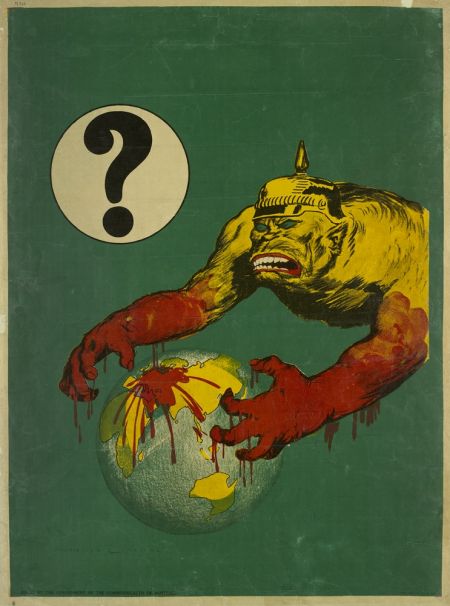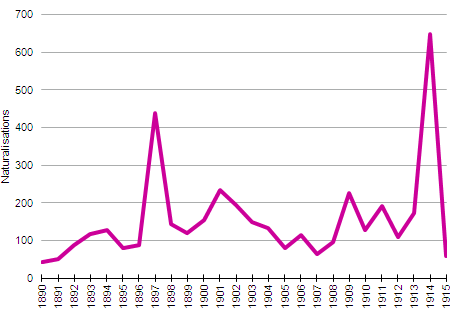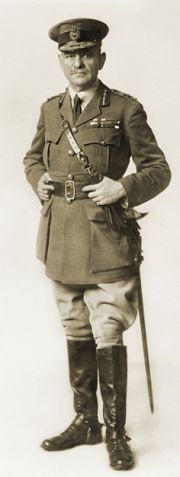Melbourne Tram Museum
- Follow Melbourne Tram Museum on Twitter
- Follow Melbourne Tram Museum on Facebook
- Follow Melbourne Tram Museum on Instagram
- Follow Melbourne Tram Museum on Pinterest
- Follow Melbourne Tram Museum on Tumblr
- Subscribe to Melbourne Tram Museum's RSS feed
- Email Melbourne Tram Museum
German-Australians and the First World War
In recent years we have recognised that the Australian forces in World War I were comprised of men from a variety of backgrounds. While those of British descent were undeniably in the majority, men with other ethnic heritages – both European and non-European – were also represented, including men with German ancestry. However having a shared heritage with the enemy could create some difficulties for such men and their families.
In 1915 Germans were the fourth largest non-indigenous ethnic group in Australia, after the English, Scots and Irish. The period from 1850 to 1890 saw large numbers of German men and families migrating to Australia – many responding to inducements offered by the colonial governments keen to attract experience and skills from the various German states.
Like many migrants, these new settlers were seeking a better life. Some had fled religious persecution, political discrimination, military conscription, famine or rural serfdom. Some families – particularly those originating from German states annexed by Prussia as a result of the 1866 Austro-Prussian War, such as Hannover, Frankfurt, Schleswig and Holstein – had little love for a nation that was perceived to be driven by Prussian interests.
Prior to World War I German settlers were generally viewed as loyal to a country that had provided opportunities unavailable in their homelands. Many of these new settlers demonstrated deep commitment to Australia by becoming naturalised citizens – over the period from 1871 to 1915 Germans accounted for one-third of all naturalisations conducted in the state of Victoria, more than any other nationality.
Thus for German-Australians their relationship with Australia may have been much stronger than ties back to a distant ancestral homeland, particularly for those who were second or third generation Australians.
One source (Williams, 2003) estimates that by 1918 roughly one in 14 of the Australian forces in World War I had German heritage. The most renowned of these men was General Sir John Monash who was born in Melbourne to German Jewish parents and rose to become commander of the Australian forces in May 1918, despite considerable opposition from some quarters due to his heritage.
Many volunteers with German ancestry faced discrimination, particularly after the May 1915 publication of the infamous Bryce report, which contained fabricated and lurid accounts of alleged atrocities committed by German troops in Belgium. This report was a key element of the British propaganda campaign and was circulated widely in Australia. The Bryce report was extremely effective in broadening the targets of anti-German sentiments from a focus on the Kaiser and Prussian militarism to personal attacks on Germans themselves.

Australian Government propaganda poster from World War I. Artist: Norman Lindsay.- Poster from the collection of the State Library of Victoria.
During this period anti-German sentiments meant that many German or German-sounding placenames across Australia were changed. In Victoria Germantown was renamed Grovedale; Hochkirch turned into Tarrington; Waldkirch became Freshwater Creek; Grünwald rechristened Arkona.
Fear therefore become another motivation for enlistment. There was a spike in naturalisations in 1914 as the German-born rushed to pledge allegiance to their adopted country. In addition some families believed that they would be protected from internment as enemy aliens by having sons in the Australian forces.

Naturalisations of German-born citizens in the state of Victoria, 1890 to 1915.- Source: Victorian Year Books.
However it was not easy for some German-Australians either to enlist or to serve. It is well-documented that volunteers with obviously German names would find their applications delayed or even rejected. Able and effective soldiers would be overlooked for promotion. Some potential volunteers avoided this problem by using pseudonyms or anglicising their names – Schmidt becoming Smith, Frederich becoming Frederick. For those with British heritage in their maternal line another strategy was to enlist under their mothers’ maiden names. In addition the religion nominated on the volunteer’s attestation form was typically stated to be Church of England or other Protestant denomination rather than Lutheran.
It should be noted that such discrimination was not universal. Many men experienced few if any barriers, many served with distinction and their actions recognised with military honours including the Victoria Cross, Distinguished Conduct Medal, Military Cross and Military Medal.
And common across all Australian troops, all too many became casualties of that conflict.
Bibliography
Australian Bureau of Statistics, Victorian Year Books, 1890-91 to 1915-16
The Bryce Report: Report of the Committee on Alleged German Outrages (1915)
John F. Williams (2003), German ANZACs and the First World War, UNSW Press.
